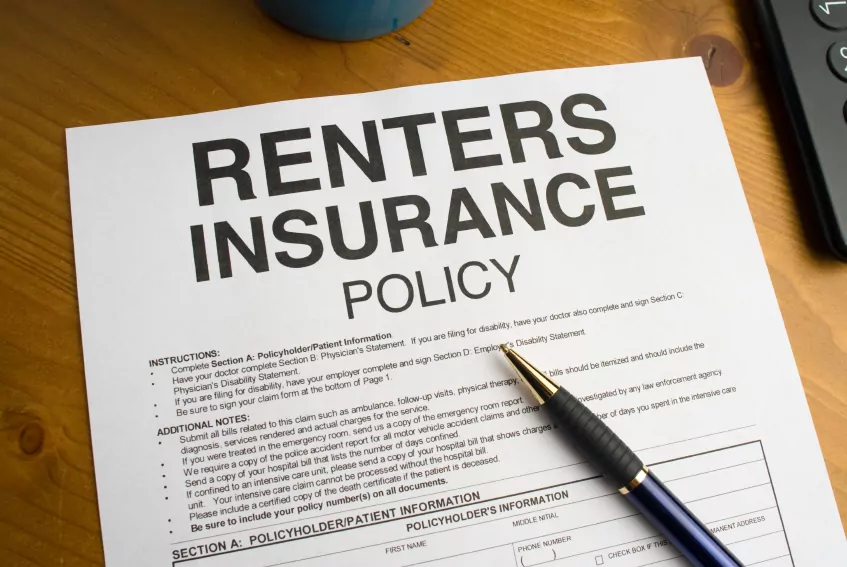If you own a rental property or rent your home, you want to ensure you have enough protection for your investment. While different insurance companies offer different types of rental property insurance coverage, there are common features all rental property insurance provides safeguards against.
The most common coverage includes property damage, liability, loss of contents owned by the landlord and loss of rental income.
Rental Property Insurance: How It Works
Landlord insurance covers many of the same things as your regular home insurance but offers further protections since tenants will be occupying your property. Typical policies cover the property, rental income and liability.
Property insurance protects the building
The most basic form of rental property insurance covers perils like fire, water damage, wind and smoke. Should any misfortunes fall upon your property, you’ll be able to make the necessary repairs without having to worry about the costs breaking your bank.
To better manage those ongoing expenses, try our free, purpose-built expense management tool for landlords
There are, however, certain things not covered by rental property insurance. Earthquake damage, sewer backup and flood insurance (for sewer backup and overland water) generally require additional coverage.
NOTE: The type of insurance coverage you require will depend on how long you are looking to rent out your property. Are you intending on renting it out to a family for a long period of time or for numerous, short-term rentals? Consider how long you will be renting out the space to see which property insurance is right for you. You can get a free, no-obligation insurance quote from us to see how much you could save.
Loss of your contents, stuff, and valuables
As the owner of your property, some of your personal belongings that are on the rental site, like fridges and stoves, generally have coverage, but for others (e.g. furniture in a furnished home), you might need additional insurance. Speak with your insurance broker about what add-ons or endorsements are available for your policy and whether they are right for you.
NOTE: Landlord insurance does not cover a renter’s belongings. We recommend adding renters, or tenants insurance as a requirement on the lease. It’s affordable and helps settle disputes.
Rental Income Insurance in case of loss of use
Rental income insurance covers lost rents due to insurable damages. If a fire breaks out, and you can’t rent out your property for a while, this insurance will kick into effect. Be aware that income insurance often covers the fair market value of a property, not necessarily what you are charging for rent. If, for example, you rent a property for $1,500 a month, but its market value is $1,000, you would only recover $1,000 in lost income per month. Seek clarity on your policy’s terms and limits.
Additionally, the coverage only reimburses lost income for the time it takes for repairs to be completed. If repairs take two months, but you decide not to rent the unit for six, you’ll only get compensation for the two months.
Liability coverage for if you get sued
One of the most important, yet underrated elements of rental property insurance is the liability coverage it provides. This coverage protects you in case a tenant or third party suffers personal injury or damage to property on your rental property. So if someone injures themself while in your rental home, or their car or other possessions are damaged while you are doing work on your property, this insurance will cover the damages in case you are sued. Most insurance companies offer bundled property and liability insurance.
How Much is Rental Property Insurance?
Rental property insurance costs are in the range of 15-25% more than your average homeowner’s insurance. If the average cost of home insurance in the USA is $1585/year, you can anticipate paying between $1,823 and $1,982/year for rental property insurance. Of course, there are numerous factors that affect this amount—things like the type of dwelling, age, location and construction will affect the price of insurance.
If you are renting out a property for income, the right platform can help you out in ways you might not have imagined. Baselane offers users a simple bookkeeping solution so you can track rent payments, rental property, tenant insurance, landlord banking all in one place. Not only can you save yourself time, but with sophisticated analytic services,
Baselane ensures you’re getting the best possible return on your investment.
Final Thoughts: Rental Property Insurance
If you’re a landlord or intend to rent out a property you own, rental property insurance is essential. Landlord insurance protects not only your property, but also those who live in and visit it. With different tiers of policies and endorsements available, you can be certain that you can find an insurance quote that works within your budget. Be sure to take the time to compare insurance quotes and speak to your provider before renting out your property to discover what options are available.
FAQs
Rental property insurance protects the property owners against damages to the building and loss of income in addition to liability coverage. If you’re thinking of renting out your own home or an investment property, it’s essential that you get rental property insurance. If an incident occurs resulting in damages to your property, or if a tenant or guest is injured and sues you, without the proper coverage, you could find yourself facing crippling bills.
Homeowners insurance will not cover damage if your home is used as a rental property. If you have an investment property you rent out, speak with your insurance provider to determine if your policy covers rental properties. If it doesn’t, you’ll want to make sure you have landlords insurance.
If you are a landlord, the great news is that you can deduct rental property insurance from your taxes. Know that you can only deduct premiums for the current tax year, so if your policy is for an extended period of time, you’ll need to do some quick math to find out how much you can claim. Not only can you deduct your insurance premiums, but most building expenses are also deductible.







